Search results for ""author john stillwell""
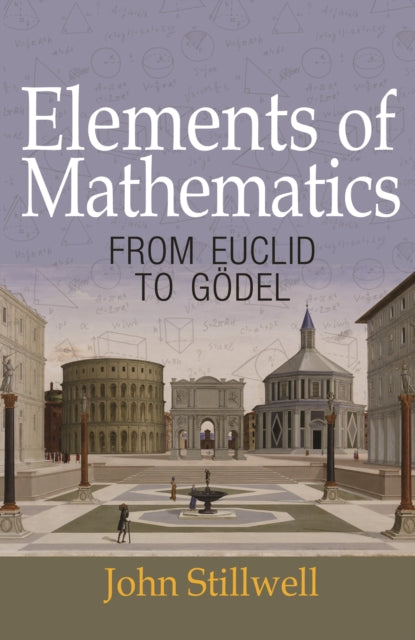
Princeton University Press Elements of Mathematics: From Euclid to Gödel
Elements of Mathematics takes readers on a fascinating tour that begins in elementary mathematics--but, as John Stillwell shows, this subject is not as elementary or straightforward as one might think. Not all topics that are part of today's elementary mathematics were always considered as such, and great mathematical advances and discoveries had to occur in order for certain subjects to become "elementary." Stillwell examines elementary mathematics from a distinctive twenty-first-century viewpoint and describes not only the beauty and scope of the discipline, but also its limits. From Gaussian integers to propositional logic, Stillwell delves into arithmetic, computation, algebra, geometry, calculus, combinatorics, probability, and logic. He discusses how each area ties into more advanced topics to build mathematics as a whole. Through a rich collection of basic principles, vivid examples, and interesting problems, Stillwell demonstrates that elementary mathematics becomes advanced with the intervention of infinity. Infinity has been observed throughout mathematical history, but the recent development of "reverse mathematics" confirms that infinity is essential for proving well-known theorems, and helps to determine the nature, contours, and borders of elementary mathematics. Elements of Mathematics gives readers, from high school students to professional mathematicians, the highlights of elementary mathematics and glimpses of the parts of math beyond its boundaries.
£35.00
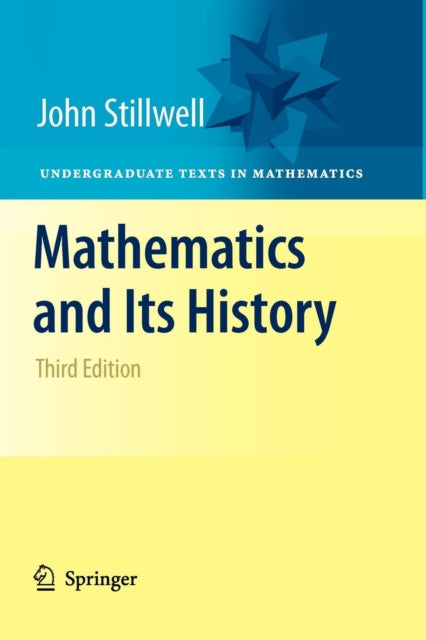
Springer-Verlag New York Inc. Mathematics and Its History
From a review of the second edition:"This book covers many interesting topics not usually covered in a present day undergraduate course, as well as certain basic topics such as the development of the calculus and the solution of polynomial equations. The fact that the topics are introduced in their historical contexts will enable students to better appreciate and understand the mathematical ideas involved...If one constructs a list of topics central to a history course, then they would closely resemble those chosen here."(David Parrott, Australian Mathematical Society)This book offers a collection of historical essays detailing a large variety of mathematical disciplines and issues; it’s accessible to a broad audience. This third edition includes new chapters on simple groups and new sections on alternating groups and the Poincare conjecture. Many more exercises have been added as well as commentary that helps place the exercises in context.
£49.99
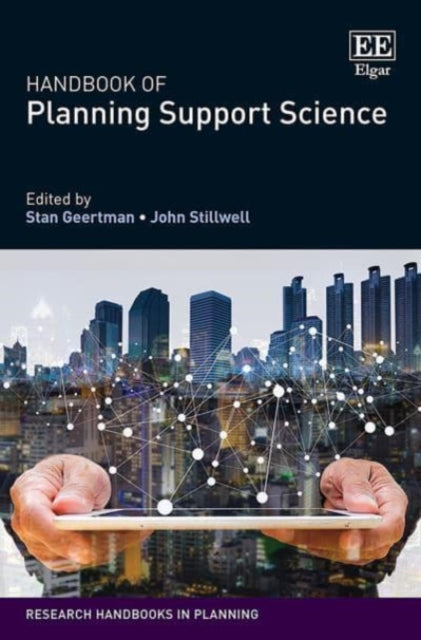
Edward Elgar Publishing Ltd Handbook of Planning Support Science
Encompassing a broad range of innovative studies on planning support science, this timely Handbook examines how the consequences of pressing societal challenges can be addressed using computer-based systems. Chapters explore the use of new streams of big and open data as well as data from traditional sources, offering significant critical insights into the field. Contributions from key scholars from around the world demonstrate how mature the field of planning support science has become in providing support for practitioners to confront diverse problems. The Handbook analyses a carefully selected range of case studies looking at digitization, big data, geodesign, applied modelling, smart city instruments and planning support systems. It addresses key urban challenges including traffic congestion, neighbourhood gentrification and urban heat-island formation, providing examples of how planning practitioners can improve modern urban conditions. Scholars of urban and regional studies as well as human geographers will find this to be a critical reference on the topic. With examples of planning applications from across the world, this will also be a key resource for urban and regional planners and policy-makers. Contributors include: J. Barton, R. Behrens, C. Biderman, M. Birkin, S. Blanchard, P. Boden, M. Campagna, Y. Chen, H. Chou, J. Claassens, C. Daniel, C. de Boer, B. Deal, Z. Deng, S. Eagleson, F. Fernandez, F. Figari, J. Flacke, Q.-L. Gao, S. Geertman, X. Goldie, R. Goodspeed, P. Greenwood, Y. Gu, S. Guhathakurta, J.D. Hamerlinck, N. Hood, R. Hughes, W. James, E. Janowicz, R. Janssen, M. Kahila-Tani, R. Kingston, B.W. Koo, E. Koomen, P. Krause, H.R. Kwon, M. Kyttä, S.Z. Leao, J. Li, S. Li, X. Li, S. Lieske, J. Liu, L. Liu, Z. Liu, O. Lock, N. Lomax, Y. Long, R. Lovelace, I. Luque-Martín, J. Martinez, S. Maurer, T. Moyo, W. Musakwa, A. Newing, H. Niu, P. Pelzer, C. Pettit, K. Pfeffer, S. Pinnegar, E. Punt, B. Rijken, R. Sieber, E.A. Silva, A.P. Smith, A. Staffans, I. Sterland, J. Stillwell, B. Stimson, T. Su, D.C. Swiatek, Z. Tomor, F. van den Bosch, V. Vlastaras, P. Waddell, S. Wang, M. Wegener, C. Whitcomb, P. Witte, A.G.O. Yeh, Y. Yue, G. Zhang, X. Zhang, N. Zhao, Z. Zheng, X. Zhou, M. Zuidgeest
£48.95
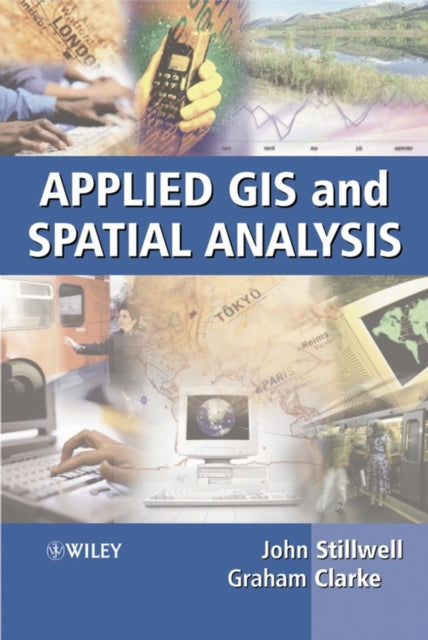
John Wiley & Sons Inc Applied GIS and Spatial Analysis
Only applications-driven book dealing with commerically-sponsored spatial analysis research. Focuses on business and public sector planning case studies, offering readers a snapshot of the use of spatial analysis across a broad range of areas. Internationally-renowned editors and contributors present a broad variety of global applications, and demonstrate GIS components and spatial methodologies in practice.
£161.95
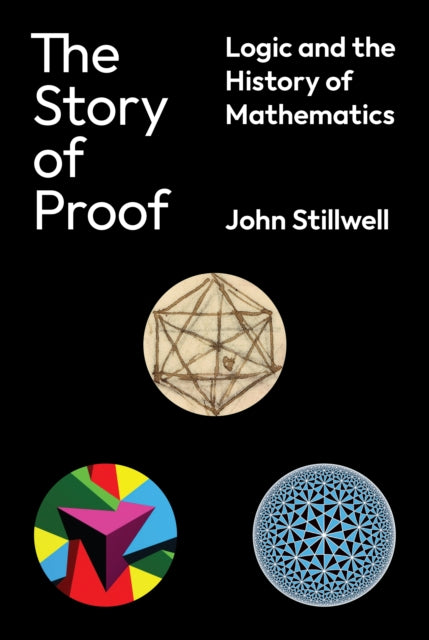
Princeton University Press The Story of Proof: Logic and the History of Mathematics
How the concept of proof has enabled the creation of mathematical knowledgeThe Story of Proof investigates the evolution of the concept of proof—one of the most significant and defining features of mathematical thought—through critical episodes in its history. From the Pythagorean theorem to modern times, and across all major mathematical disciplines, John Stillwell demonstrates that proof is a mathematically vital concept, inspiring innovation and playing a critical role in generating knowledge.Stillwell begins with Euclid and his influence on the development of geometry and its methods of proof, followed by algebra, which began as a self-contained discipline but later came to rival geometry in its mathematical impact. In particular, the infinite processes of calculus were at first viewed as “infinitesimal algebra,” and calculus became an arena for algebraic, computational proofs rather than axiomatic proofs in the style of Euclid. Stillwell proceeds to the areas of number theory, non-Euclidean geometry, topology, and logic, and peers into the deep chasm between natural number arithmetic and the real numbers. In its depths, Cantor, Gödel, Turing, and others found that the concept of proof is ultimately part of arithmetic. This startling fact imposes fundamental limits on what theorems can be proved and what problems can be solved.Shedding light on the workings of mathematics at its most fundamental levels, The Story of Proof offers a compelling new perspective on the field’s power and progress.
£34.20
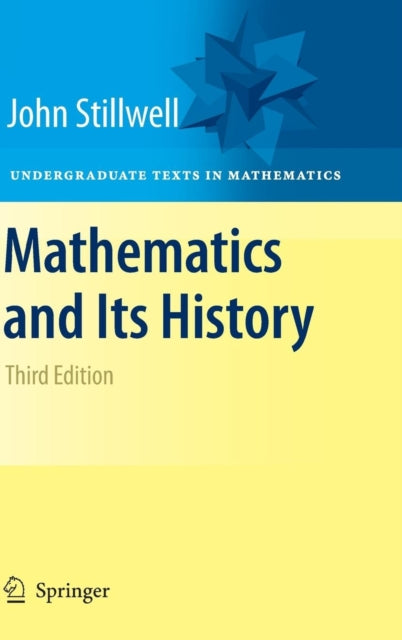
Springer-Verlag New York Inc. Mathematics and Its History
From a review of the second edition:"This book covers many interesting topics not usually covered in a present day undergraduate course, as well as certain basic topics such as the development of the calculus and the solution of polynomial equations. The fact that the topics are introduced in their historical contexts will enable students to better appreciate and understand the mathematical ideas involved...If one constructs a list of topics central to a history course, then they would closely resemble those chosen here."(David Parrott, Australian Mathematical Society)This book offers a collection of historical essays detailing a large variety of mathematical disciplines and issues; it’s accessible to a broad audience. This third edition includes new chapters on simple groups and new sections on alternating groups and the Poincare conjecture. Many more exercises have been added as well as commentary that helps place the exercises in context.
£49.99
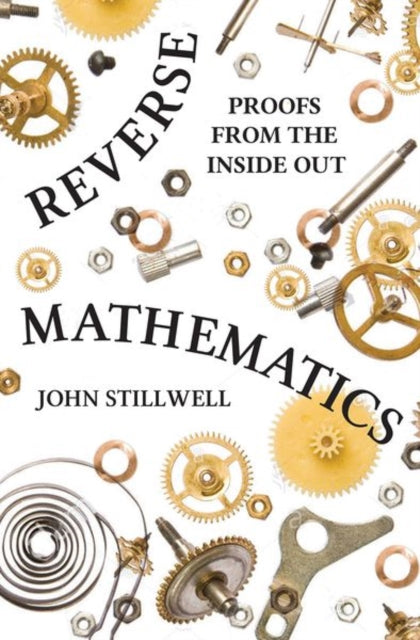
Princeton University Press Reverse Mathematics: Proofs from the Inside Out
The first book surveying the history and ideas behind reverse mathematicsReverse mathematics is a new field that seeks to find the axioms needed to prove given theorems. In Reverse Mathematics, John Stillwell offers a historical and representative view, emphasizing basic analysis and giving a novel approach to logic. By using a minimum of mathematical logic in a well-motivated way, Reverse Mathematics will engage advanced undergraduates and all mathematicians interested in the foundations of mathematics.
£16.99
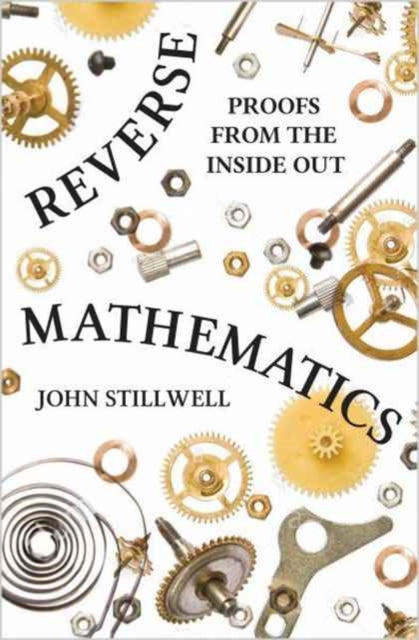
Princeton University Press Reverse Mathematics: Proofs from the Inside Out
This book presents reverse mathematics to a general mathematical audience for the first time. Reverse mathematics is a new field that answers some old questions. In the two thousand years that mathematicians have been deriving theorems from axioms, it has often been asked: which axioms are needed to prove a given theorem? Only in the last two hundred years have some of these questions been answered, and only in the last forty years has a systematic approach been developed. In Reverse Mathematics, John Stillwell gives a representative view of this field, emphasizing basic analysis--finding the "right axioms" to prove fundamental theorems--and giving a novel approach to logic. Stillwell introduces reverse mathematics historically, describing the two developments that made reverse mathematics possible, both involving the idea of arithmetization. The first was the nineteenth-century project of arithmetizing analysis, which aimed to define all concepts of analysis in terms of natural numbers and sets of natural numbers. The second was the twentieth-century arithmetization of logic and computation. Thus arithmetic in some sense underlies analysis, logic, and computation. Reverse mathematics exploits this insight by viewing analysis as arithmetic extended by axioms about the existence of infinite sets. Remarkably, only a small number of axioms are needed for reverse mathematics, and, for each basic theorem of analysis, Stillwell finds the "right axiom" to prove it. By using a minimum of mathematical logic in a well-motivated way, Reverse Mathematics will engage advanced undergraduates and all mathematicians interested in the foundations of mathematics.
£22.62
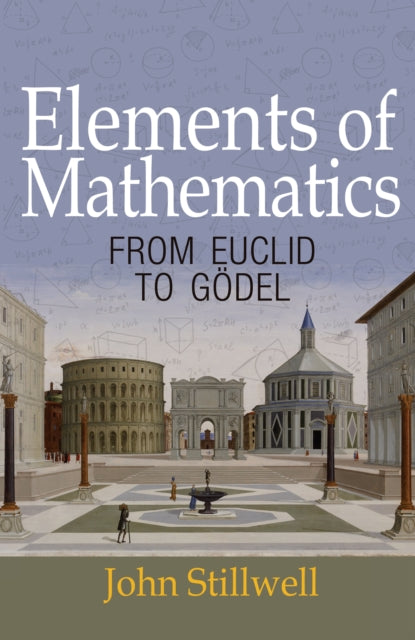
Princeton University Press Elements of Mathematics: From Euclid to Gödel
Elements of Mathematics takes readers on a fascinating tour that begins in elementary mathematics--but, as John Stillwell shows, this subject is not as elementary or straightforward as one might think. Not all topics that are part of today's elementary mathematics were always considered as such, and great mathematical advances and discoveries had to occur in order for certain subjects to become "elementary." Stillwell examines elementary mathematics from a distinctive twenty-first-century viewpoint and describes not only the beauty and scope of the discipline, but also its limits. From Gaussian integers to propositional logic, Stillwell delves into arithmetic, computation, algebra, geometry, calculus, combinatorics, probability, and logic. He discusses how each area ties into more advanced topics to build mathematics as a whole. Through a rich collection of basic principles, vivid examples, and interesting problems, Stillwell demonstrates that elementary mathematics becomes advanced with the intervention of infinity. Infinity has been observed throughout mathematical history, but the recent development of "reverse mathematics" confirms that infinity is essential for proving well-known theorems, and helps to determine the nature, contours, and borders of elementary mathematics. Elements of Mathematics gives readers, from high school students to professional mathematicians, the highlights of elementary mathematics and glimpses of the parts of math beyond its boundaries.
£18.99
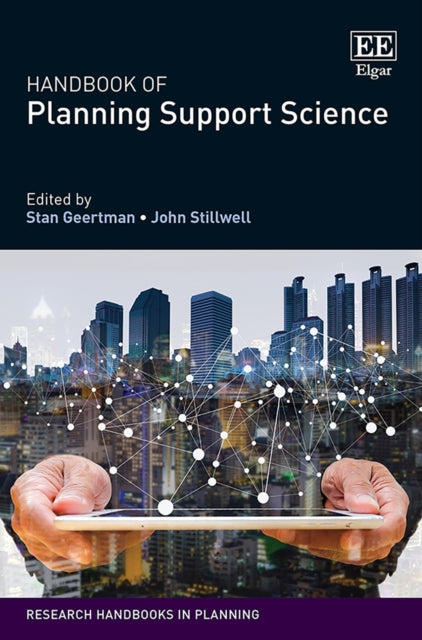
Edward Elgar Publishing Ltd Handbook of Planning Support Science
Encompassing a broad range of innovative studies on planning support science, this timely Handbook examines how the consequences of pressing societal challenges can be addressed using computer-based systems. Chapters explore the use of new streams of big and open data as well as data from traditional sources, offering significant critical insights into the field. Contributions from key scholars from around the world demonstrate how mature the field of planning support science has become in providing support for practitioners to confront diverse problems. The Handbook analyses a carefully selected range of case studies looking at digitization, big data, geodesign, applied modelling, smart city instruments and planning support systems. It addresses key urban challenges including traffic congestion, neighbourhood gentrification and urban heat-island formation, providing examples of how planning practitioners can improve modern urban conditions. Scholars of urban and regional studies as well as human geographers will find this to be a critical reference on the topic. With examples of planning applications from across the world, this will also be a key resource for urban and regional planners and policy-makers. Contributors include: J. Barton, R. Behrens, C. Biderman, M. Birkin, S. Blanchard, P. Boden, M. Campagna, Y. Chen, H. Chou, J. Claassens, C. Daniel, C. de Boer, B. Deal, Z. Deng, S. Eagleson, F. Fernandez, F. Figari, J. Flacke, Q.-L. Gao, S. Geertman, X. Goldie, R. Goodspeed, P. Greenwood, Y. Gu, S. Guhathakurta, J.D. Hamerlinck, N. Hood, R. Hughes, W. James, E. Janowicz, R. Janssen, M. Kahila-Tani, R. Kingston, B.W. Koo, E. Koomen, P. Krause, H.R. Kwon, M. Kyttä, S.Z. Leao, J. Li, S. Li, X. Li, S. Lieske, J. Liu, L. Liu, Z. Liu, O. Lock, N. Lomax, Y. Long, R. Lovelace, I. Luque-Martín, J. Martinez, S. Maurer, T. Moyo, W. Musakwa, A. Newing, H. Niu, P. Pelzer, C. Pettit, K. Pfeffer, S. Pinnegar, E. Punt, B. Rijken, R. Sieber, E.A. Silva, A.P. Smith, A. Staffans, I. Sterland, J. Stillwell, B. Stimson, T. Su, D.C. Swiatek, Z. Tomor, F. van den Bosch, V. Vlastaras, P. Waddell, S. Wang, M. Wegener, C. Whitcomb, P. Witte, A.G.O. Yeh, Y. Yue, G. Zhang, X. Zhang, N. Zhao, Z. Zheng, X. Zhou, M. Zuidgeest
£233.00










